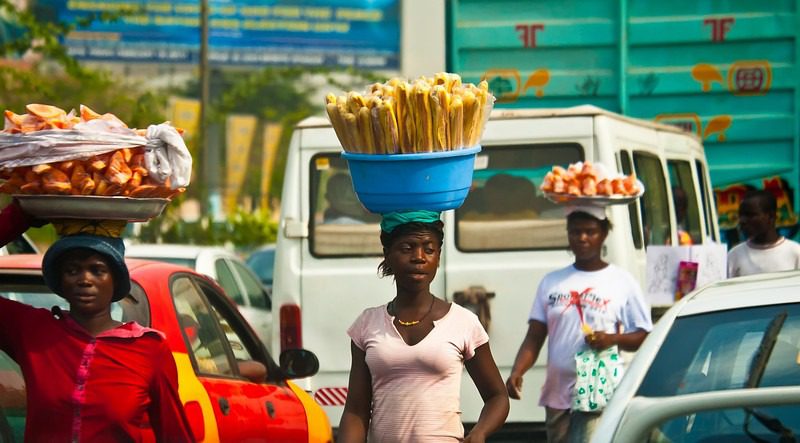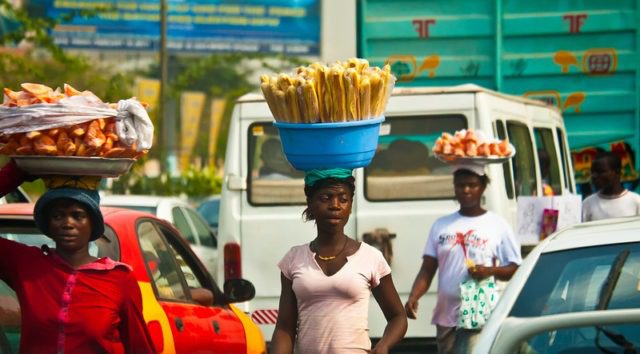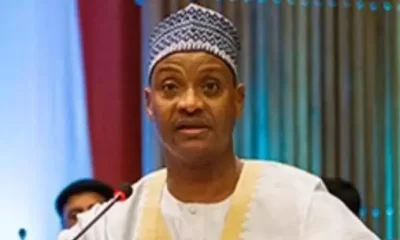National Issues
Addressing The Challenges Of Teenagers Hawking In The Major Cities of Nigeria -By Barr. Uguru Uchechukwu Okanagba


Over the years, Nigerian children and young persons have been subjected to hawking and begging in the major cities of Nigeria, like Lagos, Abuja and Port-Harcourt, etc, base on the untold hardship and life challenging situations they find themselves.
It burdens my heart that in a great country like Nigeria, there are numerous laws which if properly enforced, virtually all areas of human endeavour will be adequately and perfectly taken care of, but the bane is that majority of them are not being enforced. Virtually all the laws exist in theory and not in practice. This is because when a law is not enforced as at when due, the presumption is that such law does not exist in the first place.
In a democratic system of government like Nigeria, laws are meant to be enforced to the latter and not just to show that we have such laws like other countries which do not tamper with the full implementation of their laws.
Relying on the above premise and proposition, may I now x-ray why the problem of Nigeria is not making laws but the enforcement of the laws already made on the area of my interest for the purpose of this article.
The 1999 Constitution of the Federal Republic of Nigeria (as amended) provides in section 1 (1) as follows: “This Constitution is supreme and its provisions shall have binding force on all authorities and persons throughout the Federal Republic of Nigeria “
By section 1 (2) of the Constitution it provides: “the Federal Republic of Nigeria shall not be governed nor shall any person or group of persons take control of the Government of Nigeria or any part thereof, except in accordance with the provisions of this Constitutions”.
Section 18 of the same Constitution further provides:
(1) Government shall direct its policy towards ensuring that there are equal and adequate educational opportunities at all levels.
(3)(a) Free, compulsory and universal primary education
(b) Free University education.
In view of the sections mentioned supra, it is indisputable and unarguable that the authorities saddled with the responsibility of implementing our laws are living below the expectation reposed on them, even though they are constitutional obligated to implement laws.
It does not elude my memory that many gurus in constitutional law will not hesitate to put up justification of non-justiciability of section 18 of the Constitution cited above, owing to the fact that it falls within the fundamental objectives and directive principles of state policy, and therefore, one has no locus to ask for such right, hence it is within the objective principles which no court of law is allowed to adjudicate upon, on the ground that such provision is not actionable against the government.
This will not avail whoever that is relying on such justification because it is the overdependence of the fact that such right is not justiciable, even though, it is provided in the Constitution and evade responsibilities which ordinarily ought to be carried out, necessitated the National Assembly to in their wisdom enacted and ratified other laws to ensure that such artifice of executive lawlessness is not condoned.
Considering the intent and spirit of the Child Rights Act enacted by the National Assembly on 31st July, 2003 and the African Charter on Human and Peoples’ Right (Ratification and Enforcement) Act, ratified on 17th March, 1988, it will be obvious and glaring that the essence is to give effect to section 18 of the 1999 Constitution by palliating the hardship of children and young persons owing to their vulnerable nature.
It will not be out of place to bring out the salient sections and provisions that are to the effect that the right of children and young persons shall be considered paramount and shall not be treated with levity. Section 15 of the Child Rights Act provides:
(1) “Every Child has the right to free, compulsory and universal basic education and it shall be the duty of the Government in Nigeria to provide such education.”
This provision is in pari materia and on all fours with section 18 of the Constitution.
Section 30 (2) of the same Child Rights Act also provides:
(a) A child shall not be used for the purpose of begging for alms, guiding beggars, prostitution, domestic or sexual labour or for any unlawful or immoral purpose;
(c) A child shall not be used for hawking of goods or services on main cities, streets, brothels or high ways;
(d) A child shall not be used for any purpose that deprives the child of the opportunity to attend and remain in school as provided for under the compulsory, free universal basic education Act.
In line with the provisions of the Child Rights Act, every lettered and unlettered people of this country shall not have any impediment in agreeing that there is an Act of the National Assembly that has graciously and judiciously outlined the rights of children and young persons and equally guaranteed the protection of such rights. It is not in doubt in view of the Act that every Nigerian child and young person has the right of education and not the right of hawking and begging on the high ways and in the streets during and after school hours on the ground of poor background.
It is highly regrettable and an eyesore that our great country Nigeria, the “giant of Africa”, is encompassed by teenagers hawking and begging in its major cities like Lagos, Abuja and Port-Harcourt. These are children and young persons between the ages of fifteen to seventeen years, who ought to be taken care of if our laws are what they are meant to be. It is very worrisome that these children and young persons stays under heavy scorching of the Sun while their mates or counterparts are in Schools in order to make ends meet and our leaders did not consider such ugly situation worthy of being addressed. Under the sun or in the rain is more appropriate to the hawkers than the corps members who has it as their anthem, because it is the hawkers that are practicing it to the fullest!
This article will end up being hypothetical if I should end it without specifically mentioning some areas where the incidence is most common. If one is traveling from eastern part of this country to Lagos, immediately you get to Beggar you will be welcomed with “Gala! Gala! Gala!”. From there down to Ojota and from Ojota to Ojuelegba, what you will be seeing are teenagers hawking gala, plantain chips and other things on the high ways. The same thing applies to streets of Oshodi, Ajah, Mile 2, CMS, and Idumota, etc. vis-à-vis Abuja and Port-Harcourt areas which I cannot itemize because of its prolixity.
Many Governors and other authorities have condemned and blamed these teenagers for constituting nuisance in their States without taking any drastic or proactive measure to address the challenge in accordance with the Child Rights Act. Condemning or describing the act as disgusting alone has no bearing or positive effect whatsoever, until the right thing is done via the Act. Baning them from hawking without given a lasting solution to the problem by given them alternatives, just as the incumbent Governor of Lagos State is doing now, will not only orchestrate more harm than good but the crime rate shall be on the high level.
One cannot forget in a hurry that sometimes in 2013, the Governor of Lagos State then, Babatunde Raji Fashola loaded the teenagers hawking in Lagos State in a trailer and dumped them at Up-Iweka in Anambra State at about 2:00am without considering their plight and legal rights, even though he is a Senior Advocate of Nigeria (SAN) of whom such flagrant breach of one’s right is not expected of. Such action left many questions unanswered. Instead of giving a lasting panacea to issue of teenagers hawking in the State of Lagos in accordance with the Child Rights Act, the former Governor of Lagos State, Babatunde Raji Fashola rather resorted to turning the predicament of the children to a way of generating revenue to the State by charging the Kick Against Indiscipline popularly called “KIA” to humiliate and arrest the less privileged children & young persons, and upon being arrested they will bail themselves with heavy amount of money or else they will be subjected to inhuman torture.
The message I want to pass to our leaders based on what Fashola did is that, that did not stop the hawking rather they increased in numbers because of the high level of poverty in the country. Not that they cherished hawking but they prefer hawking than to die of hunger, hence the Government is not concerned of their rights even though, it is provided in the several laws of the land, including the Constitution which is the grundnorm.
Finally, I humbly cling on the view that for our country (Nigeria) to accomplish the hopeful change which all Nigerians are clamouring for, respect to rule of law, implementation and enforcement of our laws, regard to fundamental human rights and other rights provided by other Acts of the National Assembly and the laws made by the House of Assembly of the various States of the Federation should be considered to be a cynosure. We cannot continue to do the same thing in the same way and expect a different result!
















